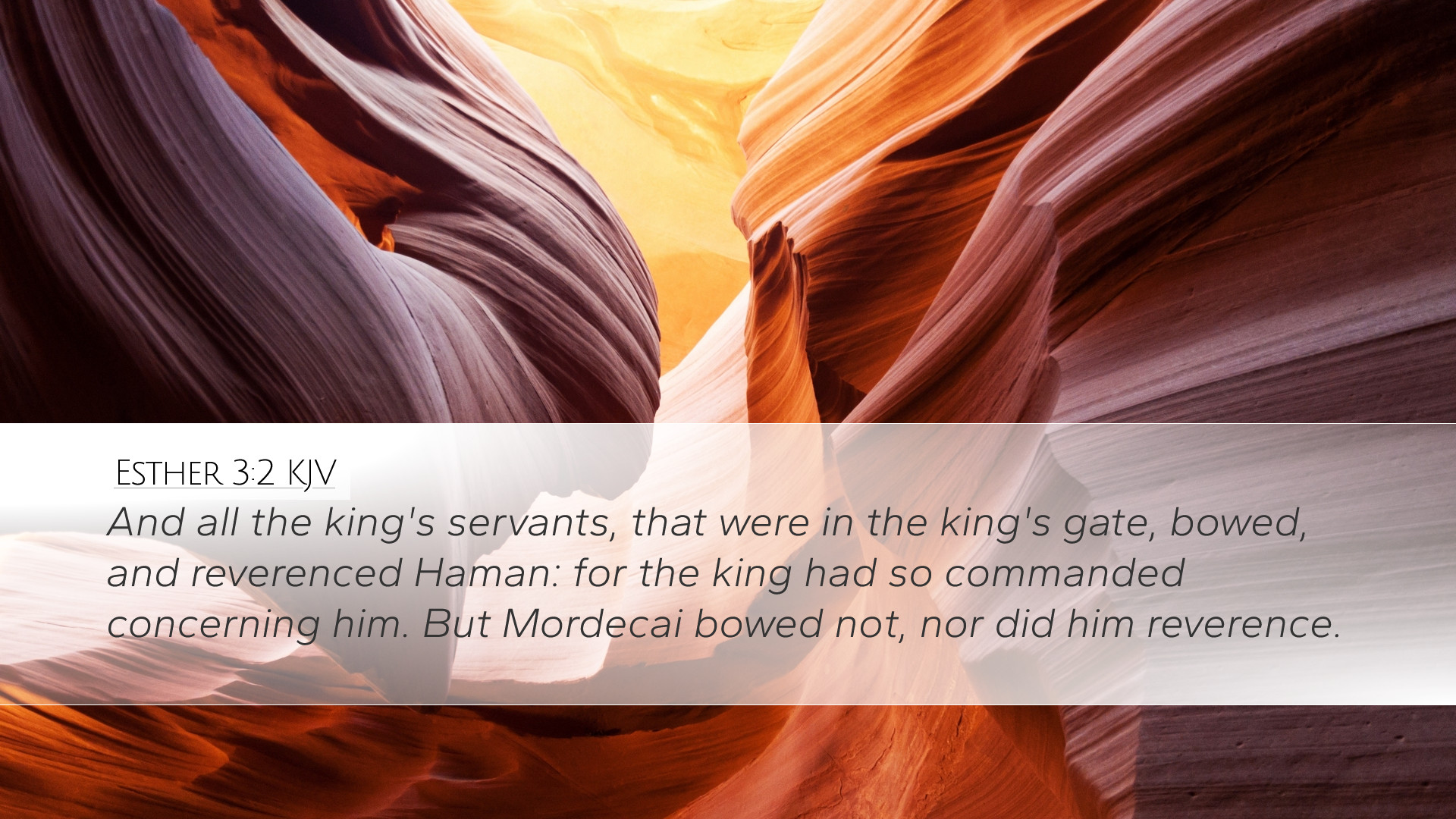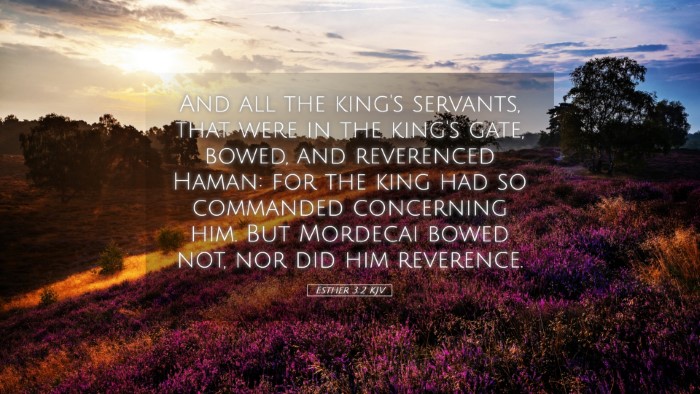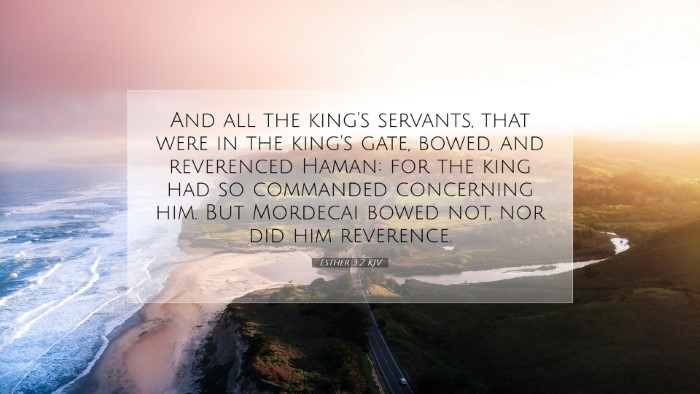Old Testament
Genesis Exodus Leviticus Numbers Deuteronomy Joshua Judges Ruth 1 Samuel 2 Samuel 1 Kings 2 Kings 1 Chronicles 2 Chronicles Ezra Nehemiah Esther Job Psalms Proverbs Ecclesiastes Song of Solomon Isaiah Jeremiah Lamentations Ezekiel Daniel Hosea Joel Amos Obadiah Jonah Micah Nahum Habakkuk Zephaniah Haggai Zechariah MalachiEsther 3:2
Esther 3:2 KJV
And all the king's servants, that were in the king's gate, bowed, and reverenced Haman: for the king had so commanded concerning him. But Mordecai bowed not, nor did him reverence.
Esther 3:2 Bible Commentary
Bible Commentary on Esther 3:2
Verse: Esther 3:2 - "And all the king's servants, who were within the king's gate, bowed and paid homage to Haman; for so the king had commanded concerning him. But Mordecai would not bow or pay homage."
Introduction
The narrative found in Esther 3:2 centers around the profound conflict arising from loyalty and identity. The refusal of Mordecai to bow to Haman serves as a pivotal moment that not only defines his character but also sets the stage for the ensuing drama that encapsulates the theme of God's providence amidst adversity.
Historical Context
This verse occurs at a critical juncture in the Esther narrative, post the ascension of King Ahasuerus (Xerxes) and following the elevation of Haman, an Agagite, to a prominent position in the Persian empire. The implications of this elevation hold much significance, particularly considering the historical animosity between the Amalekites (of which Haman was descended) and the Israelites, exemplified by the longstanding enmity with Mordecai's lineage.
Insights from Commentators
Matthew Henry's Commentary
Matthew Henry highlights the moral dilemma posed by Mordecai's refusal to bow. He asserts that Mordecai’s act was not only a display of personal conviction but also an assertion of Jewish identity and faithfulness to God's commandments. Henry posits that Mordecai’s stand can be viewed as an expression of resistance against idolatry and tyranny, urging believers to maintain their integrity when faced with societal pressures.
Albert Barnes' Notes
Albert Barnes provides valuable insight into the nature of Haman’s authority and the expectations placed upon the king’s servants. He remarks that the act of bowing was culturally significant, serving as an act of reverence and loyalty. Barnes argues that Mordecai's unwillingness to comply underscores the importance of discerning when to submit to authority and when to stand firm in one's beliefs. This tension is pivotal as it illustrates the struggle believers face in secular environments.
Adam Clarke's Commentary
Adam Clarke emphasizes the historical context of Mordecai's refusal. He notes that, as a Jew, Mordecai was obligated by the law of God to worship no other but Him. Clarke suggests that Mordecai’s stance was not merely personal but also representative of a collective Jewish sentiment against the oppression represented by Haman. The refusal to bow serves as a foreshadowing of the larger events that will unfold, encapsulating a fight for survival and identity amidst persecution.
Theological Implications
This passage raises critical considerations around authority, allegiance, and the challenges of faith within a foreign culture. The act of bowing, traditionally a sign of respect, becomes the focus of deep theological reflection regarding divine commandments versus human authority. The refusal to bow anticipates the struggles faced by all believers at various points in history, particularly those living in secular or hostile societies.
Applications for Pastors and Theologians
- Leadership Integrity: Mordecai's example serves as a reminder for church leaders to remain steadfast in their values and to lead by principles rooted in scripture, even when faced with pressures to conform.
- Understanding Cultural Context: The cultural implications of bowing versus standing firm in faith prompt reflection on how modern-day believers negotiate their faith in diverse and sometimes antagonistic environments.
- Encouragement for the Persecuted: This commentary illustrates the importance of solidarity among believers, especially those facing persecution. Mordecai's stand encourages a communal identity that resists external pressures.
Conclusion
Esther 3:2 encapsulates a profound theological and ethical challenge for believers. The narrative portrays the importance of discernment and integrity in the face of coercive authority. As Mordecai stands resolute against Haman's pride, his example calls for reflection on how Christians today uphold their faith against modern 'Hamans'—those forces that seek to undermine their convictions. In sum, this verse articulates not only historical tension but also illuminates ongoing discussions relevant to the life of faith and community today.


